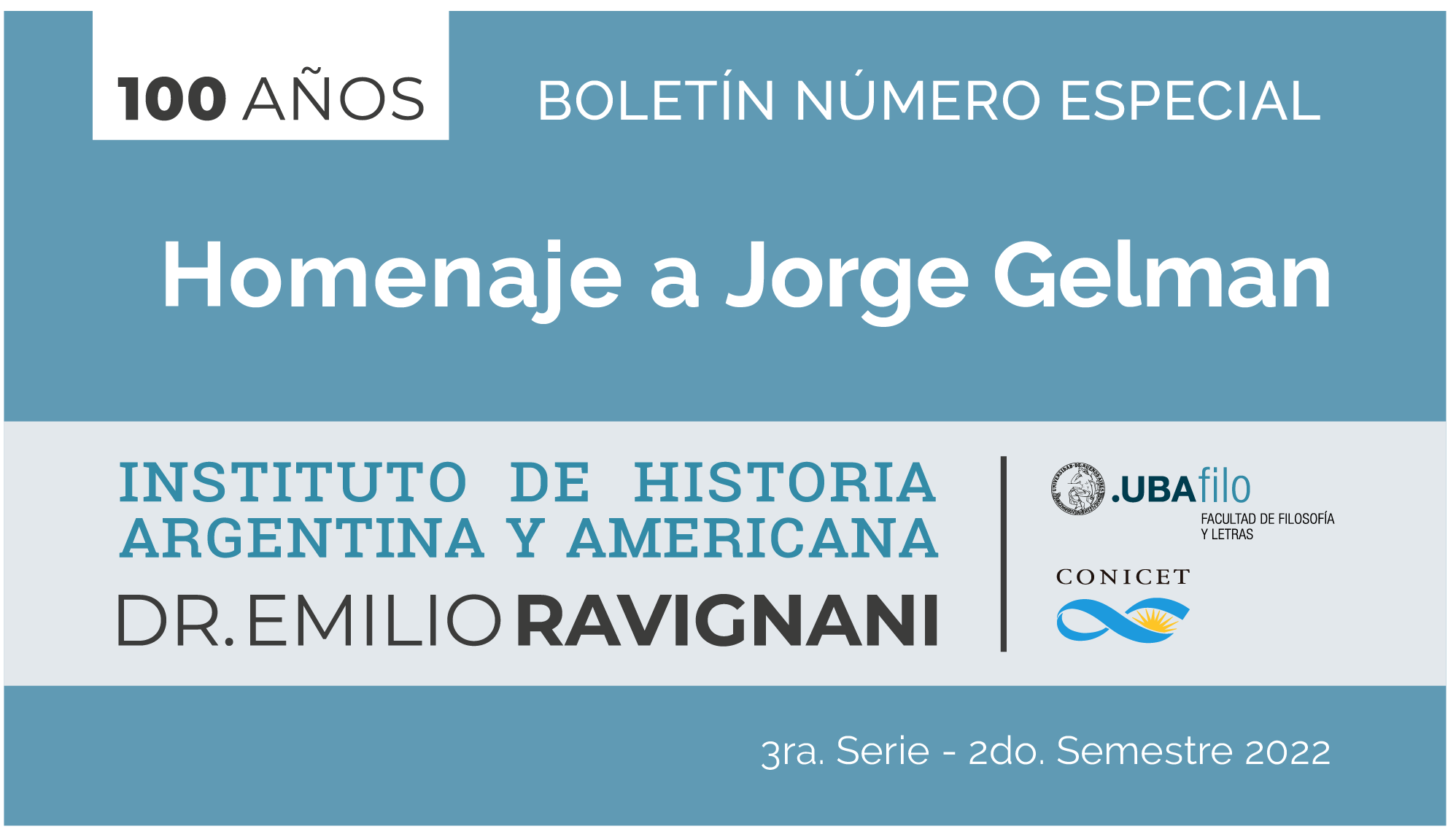Jorge Gelman y la historia del comercio, las élites y los mercados coloniales
Resumen
Se propone un análisis de los estudios de Jorge Gelman sobre las élites, el comercio y los mercados coloniales, buscando las claves del funcionamiento mercantil de antiguo régimen, y poniendo a la vez de relieve sus complejidades.Descargas
Citas
Adelman, J. (1999). Republic of Capital. Buenos Aires and the legal transformation of the Atlantic world. Stanford: Stanford University Press.
Ago, R. (1998). Economia barocca. Mercato e istituzioni nella Roma del Seicento, Roma: Donzelli.
Ago, R. (2003). Rome au XVIIe siècle: un marché baroque. Genèses, 50. https://doi.org/10.3917/gen.050.0004
Amadori, A. (2013). Negociando la obediencia. Gestión y reforma de los virreinatos americanos en tiempos del conde-duque de Olivares (1621-1643). Sevilla: CSIC-Universidad de Sevilla-Diputación de Sevilla.
Amadori, A. (2020). Agentes legos, saberes letrados y comunicación política: Buenos Aires, principios del siglo XVII. Revista de Indias, LXXX, 278. https://doi.org/10.3989/revindias.2020.003
Balmori, D., Voss, S. F. y Wortman, M. (1984). Notable family networks in Latin America, Chicago: Chicago University Press.
Barriera, D. (2013). Abrir puertas a la tierra. Microanálisis de la construcción de un espacio político, Santa Fe, 1573-1640. Santa Fe: Ministerio de Innovación y Cultura de la Provincia de Santa Fe, Museo Histórico Provincial Brigadier Estanislao López.
Barriera, D. (2018). Gouverner les campagnes. Analyse micro-sociale et construction institutionnelle (Río de la Plata, fin du XVIIIe siècle). Annales. Histoire, Sciences Sociales, 2018/1 (73e année). https://www.cairn.info/revue-annales-2018-1-page-57.htm
Bloch, M. (1931). Eli F. Heckscher, Natural- und Geldwirtschaft in der Geschichte dans Vierteljahrschrift für Sozial- und Wirtschaftsgeschichte, t. XXIII - Natural and Money Economy dans Journal of Economie and Business History, t. III [note critique]. Annales d'histoire économique et sociale. 3ᵉ année, 11. https://doi.org/10.3406/ahess.1931.1440
Brading, D. (1973). Governement and Elite in Bourbon Mexico. Hispanic American Historical Review, 53(3).
Brilli, C. (2016). Genoese trade and Migration in the Spanish Atlantic, 1700-1830. New Yok: C.U.P.
Clavero, B. (1991). Antidora. Antropología católica de la economía moderna. Milano: Giuffrè.
Dalla Corte, G. (2000). Vida i mort d’una aventura al Rio de la Plata. Jaime Alsina y Verjés, 1770-1836. Barcelona: Publicacions de L’Abadia de Montserrat.
Dedieu, J.-P. (2010). Après le roi: essai sur l'effondrement de la monarchie espagnole. Madrid: Casa de Velázquez.
Fernandez Albaladejo, P. (1992). Fragmentos de Monarquía. Madrid: Alianza.
Garzón Maceda, C. (1968). Economia del Tucumán. Economía natural y economía monetaria, siglos XVI - XVII y XVIII. Córdoba: UNC.
Gelman, J. (1983). Economie et Administration locale dans le Rio de la Plata du XVIIe siècle. Tesis de Doctorado, École des Hautes Études en Sciences Sociales, Paris.
Gelman, J. (1984). Natural economies or money economies? Silver production and monetary circulation in Spanish American (late XVI and early XVII century). Journal of European Economic History, 13(1).
Gelman, J. (1985). Cabildo y elite local: el caso de Buenos Aires en el siglo XVII. HISLA, 6.
Gelman, J. (1987). Economía natural y economía monetaria. Los grupos dirigentes de Buenos Aires a pincipios del siglo XVII. Anuario de Estudios Americanos, XLIV.
Gelman, J. (1996). De mercachifle a gran comerciante. Los caminos del ascenso en el Rio de la Plata colonial. La Rábida: Universidad Internacional de Andalucía.
Grieco, V. (2014). The Politics of Giving in the Viceroyalty of Rio de la Plata. Donors, Lenders, Subjects, and Citizens. Albuquerque: University of New Mexico Press.
Halperin Donghi, T. (2014). El enigma Belgrano. Un héroe para nuestro tiempo. Buenos Aires: Siglo veintiuno.
Heckscher, E. F. (1930-1931). Natural and money economy. Journal of Economic and Business history, III.
Herzog, T. (2003). Defining Nations. Immigrants and Citizenship Early Modern Spain and Spanish America. New Haven & London: Yale University Press.
Hoberman, L. y Socolow, S. (Eds.) (1986). Cities and Society in Colonial Latin America. Albuquerque: University of New Mexico Press.
Imízcoz Beunza, J. M. (2017). El paradigma relacional. Actores, redes, procesos para una historia global. En M. Bertrand, F. Andújar y T. Glessner (Eds.). Gobernar y reformar la Monarquía. Los agentes políticos y administrativos en España y América. Valencia: Albatros.
Kicza, J. (1983). Colonial entrepreneurs. Families and busines in Bourbon Mexico City. Albuquerque: University of New Mexico Press.
Kicza, J. (1985). The Role of the family in the economic development in nineteenth-century Latin America. Journal of Family History, 10(3).
Kraselsky, J. (2011). Las estrategias de los actores del Río de la Plata: las Juntas y el Consulado de comercio de Buenos Aires a fines del Antiguo Régimen (1748-1809). Tesis de doctorado, Universidad Nacional de La Plata.
Ladd, D. M. (1976). The Mexican nobility and independence, 1780-1826. Austin: Institute of Latin American studies.
Lockhart, J. (1968). Spanish Peru, 1532-1560: a colonial society. Madison: University of Wisconsin Press.
Metcalf, A. C. (1992). Family and Frontier in Colonial Brazil: Santana de Parnaiba 1580-1822. Berkeley & Los Angeles: University of California Press.
Moutoukias, Z. (2001). Peut-on faire l'économie d'une économie politique ? (note critique). Annales. Histoire, Sciences Sociales, 56e année, 6. https://www.cairn.info/revue-annales-2001-6-page-1111.htm
Moutoukias, Z. (2013). Des liens sociaux à l’ordre politique: réflexions pour une approche relationnelle des institutions. Caravelle, 101. https://doi.org/10.4000/caravelle.592
Moutoukias, Z. (2016). Buenos Aires, port entre deux océans: mobilités, réseaux, stratifications (2emoitié du XVIIIe siècle). e-Spania: Revue interdisciplinaire d’études hispaniques médiévales et modernes, 25. https://journals.openedition.org/e-spania/25959
Romano, R. (1960). Une économie coloniale: le Chili au XVIIIe siècle. Annales. Economies, sociétés, civilisations, 15ᵉ année, 2. https://doi.org/10.3406/ahess.1960.420634
Romano, R. (1977). Problèmes et méthodes d’histoire économique de l’Amérique latine. Cahiers Vilfredo Pereto. Revue Européenne de Sciences Sociales, XVI.
Socolow, S. (1978). The merchants of Buenos Aires. 1778-1810. Family and commerce. Cambridge: Cambridge University Press.
Socolow, S. (1987). The Bureaucrats of Buenos Aires, 1769-1810: amor al real servicio. Durham: Duke University Press.
Todeschini, G. (2008). Richesse franciscaine. De la pauvreté volontaire à la société de marché. Paris: Verdier.
Todeschini, G. (2017). Les marchands et le Temple. La société chrétienne et le cercle vertueux de la richesse du Moyen Âge à l'Époque moderne. Paris: Albin Michel.
Todeschini, G. (2019). Au ciel de la richesse. Le cœur théologique caché du rationnel économique occidental. Annales. Histoire, Sciences Sociales, 74e année, 1.
Trivellato, F. (2009). The Familiarity of Strangers: the Sephardic Diaspora, Livorno, and Cross-Cultural Trade in the Early Modern Period. New Haven & Londres: Yale University Press.
Wasserman, M. (2018). Las obligaciones fundamentales. Crédito y consolidación económica durante el surgimiento de Buenos Aires. Buenos Aires: Prometeo libros.
Derechos de autor 2022 Boletín del Instituto de Historia Argentina y Americana Dr. Emilio Ravignani

Esta obra está bajo licencia internacional Creative Commons Reconocimiento-NoComercial 4.0.
Los derechos de autor son cedidos al Boletín, pero los autores podrán recuperarlos y reproducir su trabajo en otros medios o formatos mediante una solicitud por escrito al Comité Editor. En esos casos, se citará al Boletín como primera publicación del trabajo.
Las obras quedan licenciadas bajo una Licencia Creative Commons Atribución-No Comercial 4.0 Internacional, que permite a otros compartir el trabajo con un reconocimiento de su autoría y la publicación inicial en esta revista.
También, mediando solicitud por escrito al Comité Editor del Boletín, los autores pueden establecer por separado acuerdos adicionales para la distribución no exclusiva de la versión de la obra publicada en esta revista (por ejemplo, situarlo en un repositorio institucional o publicarlo en un libro), con un reconocimiento de su publicación inicial aquí. No se permiten usos comerciales.



















